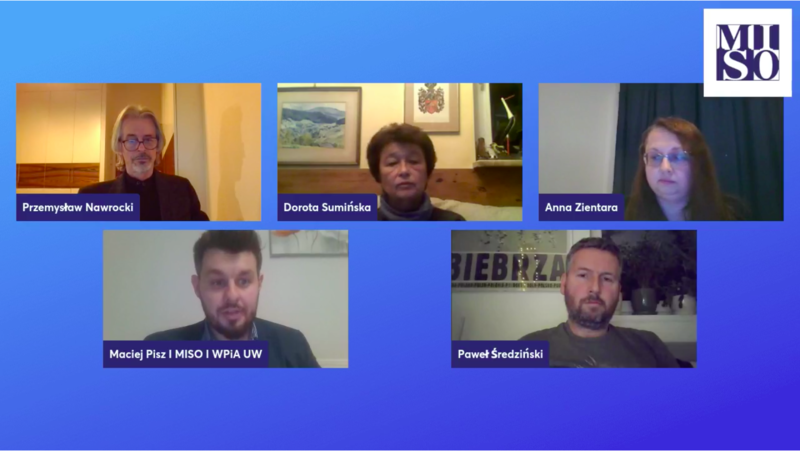Legal Protection of Animals - Expectations vs. Reality
The attended speakers were: veterinary surgeon Dr. Dorota Sumińska (publicist, author of books), Dr. Anna Zientara (Faculty of Law and Administration, University of Warsaw), Dr. Paweł Średziński (journalist, publicist) and Dr. Przemysław Nawrocki (WWF Poland). The moderator of the debate was Dr. Maciej Pisz (Vice President of MISO).
The debate focused on presenting some issues of legal protection of animals in Poland and its effectiveness. In his introduction to the discussion, Dr. Maciej Pisz noted that animals - as creatures that feel pain and suffering - constitute a special category subject to legal protection, which also results in a major legislative challenge for the legislator. Moreover, the moderator pointed out that the legal protection of animals is an interdisciplinary issue of interest to lawyers, doctors, ethicists or sociologists, among others.
During the debate, the speakers presented their insights into the legal protection of animals and discussed the level of protection guaranteed by Polish public authorities. Vet. Dorota Sumińska emphasized that animals - under the law - are things and, as such, they have no rights. She further noted that there is no possibility of creating a good statutory regulation to protect animals,unless some animals at least are given the status of subjects (rather than objects). The speaker also pointed out that the current Law on the Protection of Animals is not only imperfect, but not properly observed either.
Next, Dr. Anna Zientara stated that since its enactment in 1997, the Law on the Protection of Animals had been amended several times, including with regard to criminal sanctions imposed by the legislator for killing animals. The speaker also suggested that sanctions for crimes against animals could be expected to increase in the future.
Dr. Przemyslaw Nawrocki - as a biologist working in the field of water and species protection - noted, among other things, that humans (as a species) are responsible for a rapid disappearance of plant and animal species diversity, and addressed a series of practical problems concerning wildlife protection. He also mentioned an enormous challenge for lawmakers involving the protection issue in this area.
Supplementing the speakers’ statements Dr. Paweł Średzinski noted that a very big social change is taking place in Poland, proving that Poles are beginning to perceive the world of animals and its legal protection in a completely different way (while underlining that the perception of this issue depends on various conditions, including the geographic ones or occupations performed). The speaker further stressed that the key issue remains how the Polish state resolves systemically the problems of legal protection of animals (e.g. with regard to wild animals).
An important demand made during the debate by Dr. Anna Zientara (and endorsed by, among others, veterinarian Dorota Sumińska) is the establishment of a new public authority body specializing in the legal protection of animals - a kind of Animal Rights Ombudsman. Dorota Sumińska also drew attention to the need to build a dialogue between legal and natural environment circles (including hunters and breeders, broadly speaking), as well as to establish cooperation between the communities carying about the protection of animal rights and the entities (the public authorities to include) responsible for educating the public.


